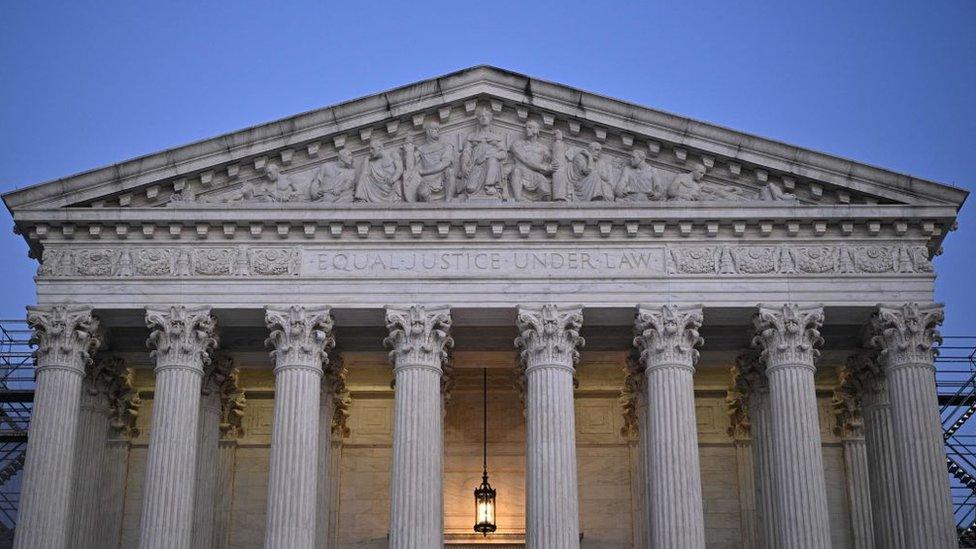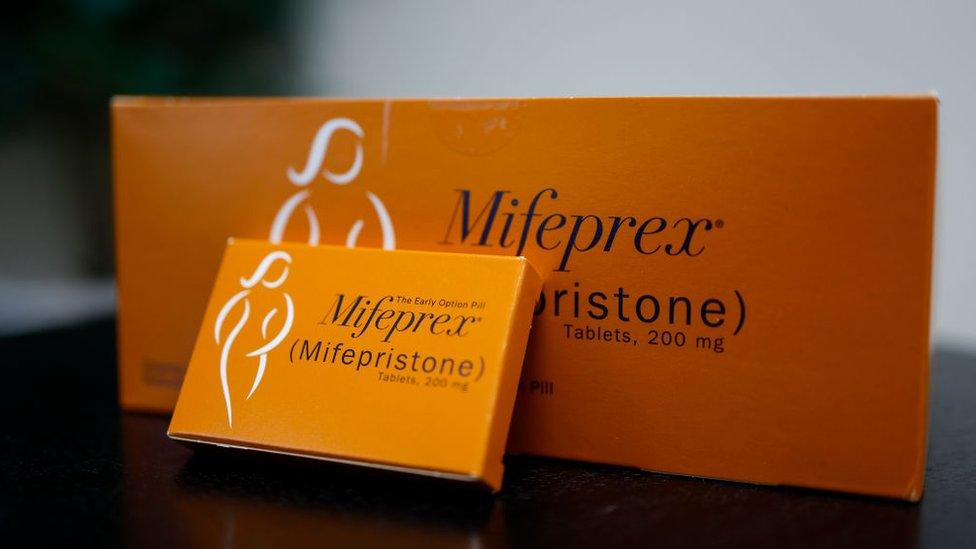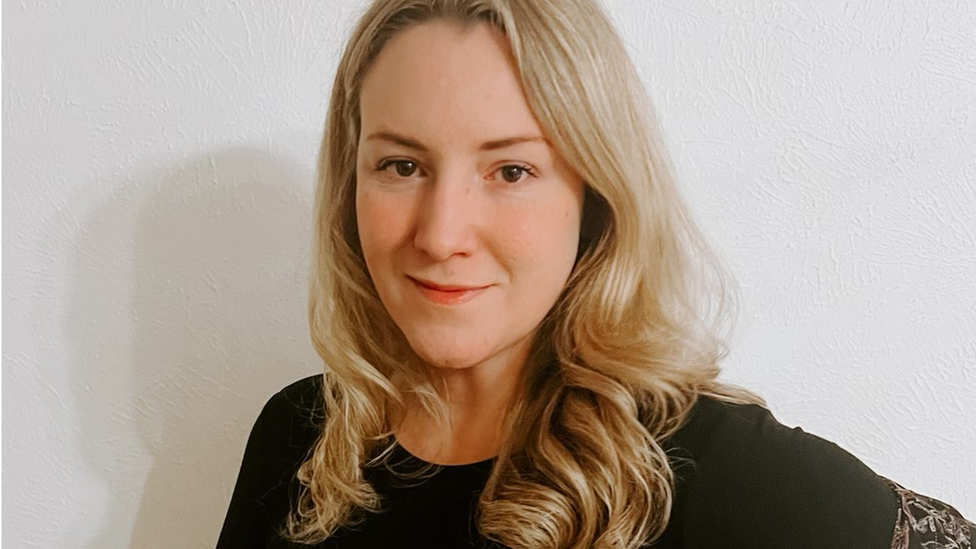US Supreme Court to consider abortion pill case
- Published

The top court has agreed to take up a case challenging the commonly used pill
The US Supreme Court will decide whether to restrict access to a commonly used abortion pill.
It will be the most significant US reproductive rights case after the court overturned Roe v Wade, ending a nationwide right to abortion.
The Biden administration had asked the court to overturn a decision to limit access to the drug mifepristone over anti-abortion groups' safety concerns.
The pill has been legal in the US since 2000 and research has shown it is safe.
The Supreme Court, which has a 6-3 conservative majority, will hear arguments early next year. A ruling is expected next summer, months before the next presidential election.
This current clash over access began in November 2022, when an umbrella group of anti-abortion doctors and activists known as the Alliance for Hippocratic Medicine sued in Texas. They claimed the Food and Drug Administration (FDA) had unlawfully approved the drug and alleged the pill was unsafe.
The case puts the court back in the position to decide American reproductive rights, less than two years after overturning Roe v Wade - a landmark 1973 ruling that guaranteed abortion access in the US.
Since the court nixed the decades-old decision, nearly two dozen states have moved to ban or restrict abortion procedures. Other states have moved to expand access by adding legal safeguards.
More recently, that battle over abortion has centred on medication abortions, now the most common method of ending pregnancies in the US, according to the Guttmacher Institute, a pro-abortion research group.
The two drug-regimen was approved for use up to 10 weeks of pregnancy by the FDA in 2000. When used, a patient is first given mifepristone to induce an abortion and then misoprostol to empty the uterus.
Since 2016, the FDA has further eased access to the drug. The agency has allowed doctors to meet patients via telemedicine and prescriptions to be sent by mail.
Over its two decades of use, the FDA, the American College of Obstetrics and Gynaecologists (ACOG) and other mainstream medical organisations have maintained that both drugs are safe.
Abortion advocates have long championed medication abortion as a less expensive and less invasive method of ending pregnancy. Anti-abortion groups have countered with claims that abortion pills - cast as "chemical abortion" - are ineffective and dangerous.
In April, Texas Judge Matthew Kacsmaryk, who has shared anti-abortion views publicly, sided with those suing and imposed a nationwide ban on mifepristone. He argued the FDA had erred in its scientific assessment of the drug and violated federal rules that allow some drugs to be approved more quickly.
An appeals court later allowed the drug to remain on the market with some restrictions. The Supreme Court then paused the rulings while the case played out.
The justices said on Wednesday they would decide whether to keep recent restrictions implemented by the lower courts. The Supreme Court's ruling could bring back earlier rules, requiring patients to visit a doctor's office for a prescription and to pick up the drug in person.
The Supreme Court declined to reconsider mifepristone's FDA approval, however, suggesting the justices are unlikely to completely pull the pill from the market.
The decision could affect abortion access for millions of women, particularly in states where abortion access is severely restricted.
Watch: Abortion pills explained in 60 seconds
Nancy Northup, the president of pro-choice group Center for Reproductive Rights applauded the court's review of the "erroneous" restrictions on mifepristone.
"Abortion pills have been used safely in the US for more than 20 years, and they are more important than ever in this post-Roe landscape. That is precisely why the anti-abortion movement is attacking them," she said in a statement.
Some anti-abortion groups also welcomed the court's decision, alleging the case would illuminate the dangers of abortion pills.
In a statement, policy director of anti-abortion group Susan B Anthony Pro-Life America Katie Daniel told the BBC that the FDA "has misled the American people with its repeated claims that the abortion pill regimen is 'safe and effective'". She blasted the agency for allowing telemedicine and mailed prescriptions.
US studies say medication abortion is effective at ending pregnancy about 95% of the time, external and there is less than 1% chance of further medical follow-up.
Deaths associated with mifepristone since its approval are fewer than those linked to common antibiotics used to treat bronchitis, sore throats, and other bacterial infections.
The court's decision could have major implications for other FDA-approved drugs as well, Carl Tobias, a law professor at the University of Richmond, said.
"The plaintiffs' efforts potentially implicate the entire FDA new drug application process, which could undermine research and development of new drugs that save lives and reduce pain," he said.
Related topics
- Published18 May 2023

- Published13 December 2023

- Published8 November 2023
